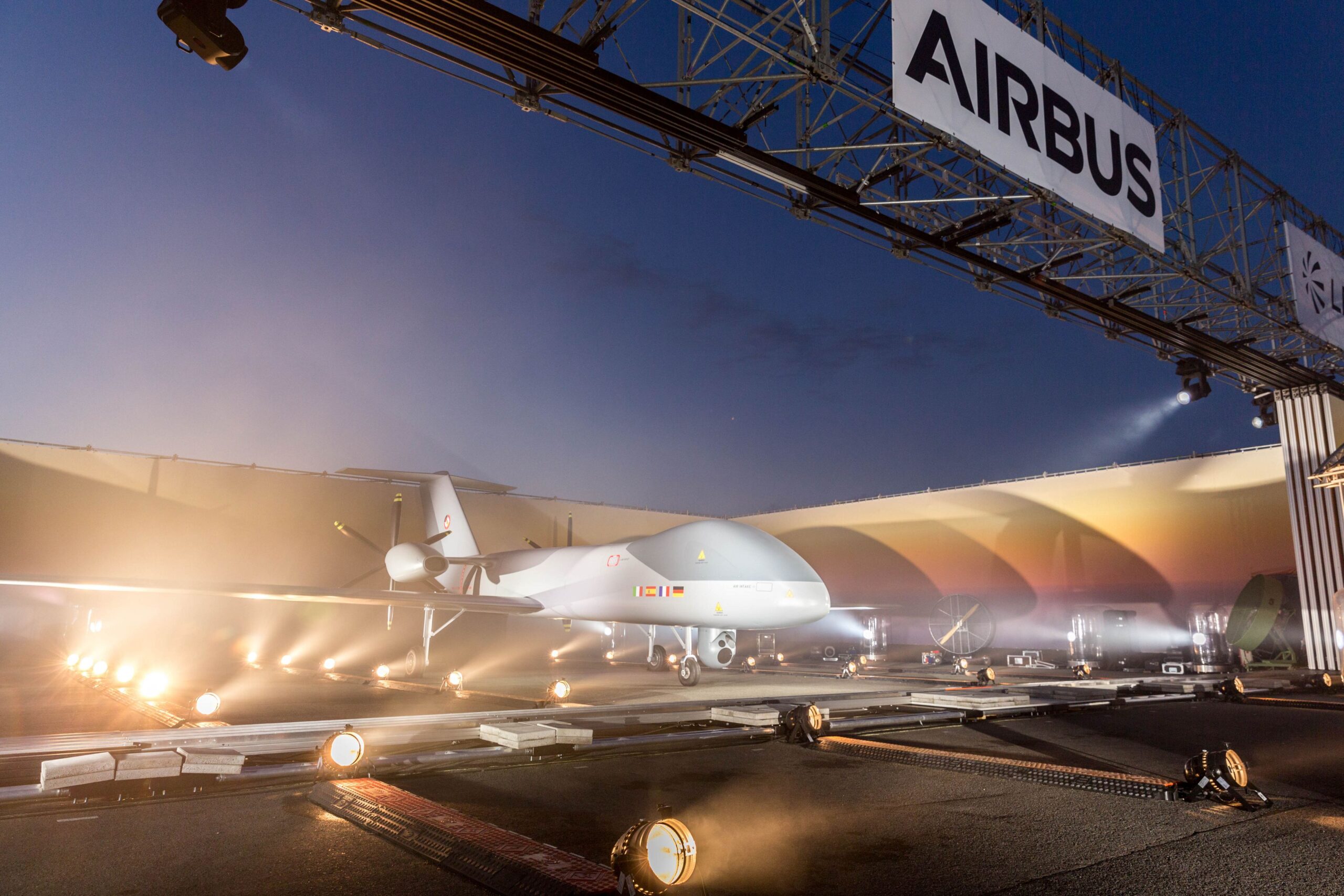The majority of the population in Germany is against the acquisition of armed drones; nevertheless a contract to procure them may soon be signed. The Social Democratic Party can still prevent the deal.
Before June 15th, the German Ministry of Defense plans to sign a contract to lease seven weaponizable drones. The deadline for concluding the lease agreement that was offered last year has once again been extended. The Airbus Group, the arms company that is the prime contractor in the drone procurement deal, confirmed this to the German Ministry of Defense. The previously agreed-upon price of around 900 million Euros will still be honored.
Acquisition of the drones, which are produced by the Israeli manufacturer Israel Aerospace Industries, will be among the most important of the new German military procurements. The project is described as „MALE HERON TP“ in the Defense Ministry’s current arms report „MALE“ stands for an unmanned aircraft with medium altitude and long endurance. „HERON“ is the cute name of the birdlike aircraft. „TP“ refers to the second generation of this drone. The first generation is already in flight for the German armed forces (Bundeswehr) in two areas of operation. In Afghanistan and Mali the „HERON 1“ remains unarmed, but the new „HERON TP“ can carry laser-guided missiles and bombs under its wings.
The Social Democratic Party (SPD) is divided
For four years now the German government has been preparing the new drone acquisition. The first „HERON TP“ drones are to be delivered two years after conclusion of the lease contract. The German parliament (Bundestag) was expected to approve the deal last summer. But literally at the last possible moment, the SPD pulled the emergency brake. It had apparently occurred to the politicians that in only three months they would stand for re-election to the Bundestag. Armed drones are not popular. According to polls, two thirds of the German population opposes them.
Now, one year later, the SPD’s concerns seem to have evaporated; however, this time the „HERON TP“ drones would initially be leased without weapons. According to the new German government coalition agreement, whether and with what weapons the new drones would be armed is to be determined by the German parliament at a later date „following a detailed assessment of international law, constitutional law and ethics considerations”.
„It seems as though the SPD parliamentarians, likely in concert with the parliamentarians of the Green and the Left parties, could in the end decide against weaponizing the drones. Would the „HERON TP“ then only be allowed to fly off as an observer, peering down from a great height with an optical monitoring device? Thomas Kachel, the expert advisor for security policy of the Left Party in the Bundestag, does not believe this to be likely. He sees the SPD as divided into two camps: „Some have moral concerns, others have bought into the line of the Ministry of Defense that drones are militarily absolutely necessary. This second group, which also has the upper hand in the Defense Committee, will win – in the long run“.
The German-American Elsa Rassbach, a long-time activist in the peace movement, is not so sure. „It is possible that the Bundestag might in fact later decide against weaponizing the drones. Then the new drones would only be allowed to fly for surveillance purposes. For this, the ‘HERON TP’ drones are much too expensive. The Budget Committee of the Bundestag therefore may not approve the lease contract at this time. Moreover, it could have a huge impact if Germany were to say: we will not be deploying weaponizable drones. Trump might not care, but in Europe this would trigger big discussions“.
„Arned drones undermine international law“
Once an activist in the 1968 student movement, today Elsa Rassbach is active in Attac and in nationwide German peace networks. „The peace movement must give more priority to the anti-drone campaign. Armed drones undermine international law in a special way“. The message has been received: the largest German section in War Resistance International (the Deutsche Friedensgesellschaft – Vereinigte KriegsdienstgegnerInnen -DFG-VK), has therefore appointed Elsa as coordinator of the working group on drones. It is the oldest organization of the German peace movement.
But what difference does it make whether a bomb that kills people, such as in Kunduz in Afghanistan, is dropped by a warplane or by a drone? The German military argues that its own troop casualties would be minimized by the use of drones, for instance if the aircraft were to be shot down over enemy territory. Thomas Kachel recalls the Vietnam War: „The troop casualties at that time had a decisive impact on public opinion“.
Back then Elsa Rassbach made her way through the GI bars in Berlin and called on American soldiers to resist the war in Vietnam. „We should also help today’s German soldiers to become more aware“, says the peace veteran. „We should show them the film ‘National Bird’, in which three US drone program whistleblowers tell of their feelings of guilt and visit Afghan victims. Afghanistan would perhaps be one of the countries where the German armed drones would also be deployed.
„Social debate“ cancelled
According to Thomas Kachel, the introduction of unmanned weapon carriers also leads to an automation of war. „The reaction times force the opponent to respond in ever shorter intervals. In the process it is clear that the human is the slower machine“. His argument is similar to that of Marcel Dickow, who six years ago wrote „A Plea against Flying Robots“ for the government-related German Institute for International and Security Affairs (Stiftung Wissenschaft und Politik).
In 2014 the SPD parliamentary group brought the physicist, who conducts research on robotics, cyber security and space, to speak during a session of the Defense Committee of the Bundestag. As in the current coalition agreement, the previous Grand Coalition of the CDU/CSU and SPD had promised to examine „questions of international law, constitutional law, security policy and ethics“ before acquiring armed drones. All the political parties represented in the Bundestag were granted the right to invite a total of eight experts to a public hearing on armed drones. The debate, pro and contra, lasted for several hours, but the Ministry of Defense regarded this controversial discussion merely as a go-ahead to begin negotiations with drone manufacturers in the USA and in Israel. And the „social debate“ that had been promised by the German government never took place.
Now all terms of the drone lease contract have been negotiated, and the conclusion of the contract is imminent. Can the approval by the SPD of this arms deal still be averted? „Last year there was good cooperation with the peace movement, which exerted political pressure in the weeks and months prior to the planned execution of the lease contract and thereby ensured a good presence in the media. They should try that again“, says Thomas Kachel. „Perhaps this would again raise the awareness of one or another SPD representative regarding the issues“.
Competitor wants to sue
The drone project could also possibly be postponed by legal disputes. Last year, the competing US firm General Atomics had wanted to sell its „REAPER“ drones to the German military but there had been no call for bids,. So General Atomics filed a lawsuit against the German Ministry of Defense. However, the Higher Regional Court in Düsseldorf ruled that the award of the drone lease contract to the Airbus Group had been lawful.
As grounds for awarding the contract without a call for bids, the Ministry of Defense argued that there is only one unique rocket in the entire world that has the capability to bear „small, scalable and standoff-capable precision ammunition“. And the manufacturer of this rocket had refused to fit the weapon into a US-produced drone.
Company and product details are classified as „secret“, but most likely this concerns the laser-guided weapon „Whip Shot“, which is being developed by Israel Military Industries, a state-owned arms group. After a strike with this weapon has been launched, it can be delayed or aborted until shortly before reaching the target. And the force of the detonation can still be altered up until impact.
However, now the German government wants to procure the „HERON TP“ initially unarmed, and the German parliament will first take up the issue of possibly arming them with missiles and guided bombs at a later date. Therefore, the lease contract would be awarded at a time when consideration of the unique selling point of guided weapon that is only available from Israel remains irrelevant. Therefore, according to SPIEGEL, the US competitor General Atomics is considering filing a lawsuit on grounds of unfair competition if the lease contract for unarmed drones is concluded with the Israeli manufacturer.
„Eurodrone“ is on its way
Whether armed or unarmed, the „HERON TP“ is only intended as a temporary solution. By 2025, the Ministry of Defense wants to develop a weaponizable „Eurodrone“ to production readiness. Airbus is also in charge of this project, with the arms companies Dassault (France) and Leonardo (Italy) among the other partners.
The parties involved are trying hard to keep to the schedule. A two-year definition phase was ended ahead of schedule, perhaps because the essential design requirements for the “Eurodrone” had already been established. The drone is to be powered by two turboprop engines and to be capable of bearing weapons.
At this year’s ILA Berlin Air Show, the manufacturing companies exhibited a model of the „Eurodrone“ for the first time. According to the Ministry of Defense, the call for bids will be issued this spring. The contractors are expected to complete a prototype of the „Eurodrone“ within five years.
Image: Mock-up of the „Eurodrone“ (all rights reserved Airbus Defence and Space).
Proof-read of translation: Elsa Rassbach.




